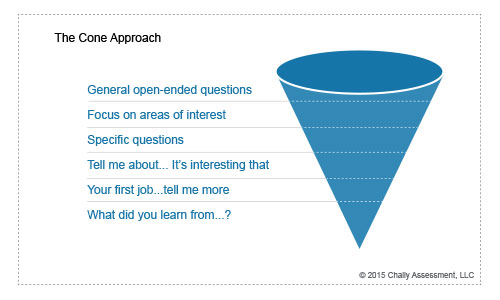How to Interview Sales Candidates to Get the Real Picture
Chally realizes that more emphasis is put on the interview than any other selection aspect. Here are key factors on how to interview sales candidates that experience has proven to be valuable. We’ve also included a short, practical interview example to assist in interview design.
Planning Interviews
While interviewing may be the most common of selection techniques, it is effective only if it focuses on factors that are truly observable. The format should be structured and applied consistently across all candidates. An interview:
Can:
- offer an avenue to explain unclear background data
- provide an opportunity to evaluate presentation skills, poise, appearance, and the ability to think on one’s feet
- furnish an opportunity to check stress tolerance, planning, and some learning ability
Can’t:
- verify honesty or integrity
- attempt to separate between real motivation and the present need for a job
- provide totally objective and valid proof of non-bias for legal purposes (in most cases)
Conducting Interviews
Determine the job-relevant characteristics and skills necessary to do the job successfully and define the purpose of a specific, upcoming interview. This will depend on where the interview is positioned in the selection process. Earlier interviews typically screen people out while later interviews focus on confirming a positive impression which could lead to an offer.
Prepare the questions and determine the match between the person and the job. Start the interview by greeting the candidate in a professional manner, establishing rapport, and stating the objective for this specific interview.
Allot time to discuss each key area before you discuss the job requirements and your company. The amount of effort you spend on “selling” the job and the company should be determined by how closely the applicant appears to match your requirements.
Finally, ask the applicant if he or she has any questions and respond accordingly. Finish by telling the candidate the next steps and by reviewing what to expect.
Getting the Real Picture, Putting the Candidate at Ease
This is often called a “permissive environment.” By helping the person to feel free to talk, you create the opportunity for the applicant to provide more candid responses.
Listen – Don’t Give Away the Show
The key point of a selection interview is to gather information, not to sell. Even naive and inexperienced candidates can follow interview clues projected by a talkative interviewer, allowing them to package their answers. Practice the 80/20 Rule: listen to the applicant 80% of the interview; talk 20%.
Silence – Don’t Be Afraid of It
Talking may be either communication or a defense. Too much of it on your part is an indication of your own discomfort with silence. Likewise, the need for an interviewee to talk too much indicates discomfort with silence, a characteristic that can hinder future success. No one can listen while talking.
Offer Opportunity – Not Just Security
Good employees tend to live on their own merits and expect to be rewarded as a result. They prefer more opportunities for growth, not just long-term security. They may be unwilling to commit to guarantees for employment tenure.
Look for People Who Exhibit the Courage of Their Convictions
People are better suited to persuade others to buy an idea or product in which they strongly believe. Even the best actor cannot feign a false belief in the product all the time. A lack of conviction leads to cynicism and, eventually, problems for the candidate.
A Structured Interview Example
In terms of overall impact on the value of an interview, asking the right questions is second only to understanding what you are looking for in the first place.
For an in-depth interview, we advocate a “Cone Approach.”

When using this approach, the interviewer starts by asking open-ended questions which focus on a characteristic sought in the candidate.
As you can see, coning questions often start with the broad inquiry, “tell me about.” For example, an opening question could be, “Tell me about yourself. How would you describe yourself in a work situation?” As the candidate answers, listen for areas of interest, and begin focusing downward in the cone. In our example, a more narrow, second-stage question might be, “What have been some of your biggest mistakes?”
This last question would lead you to the bottom of the “cone” with a very specific follow-up question intended to pinpoint what was learned from key mistakes as in, “What did you learn from _____ (one specific mistake)?” In this example, what you are looking for is a person who owns his or her mistakes and can persevere in spite of barriers. Having debriefed what went wrong in order to learn for the future, your candidate has taken responsibility for fixing the situation. It is this final point in the inquiry where you can start forming conclusions about the candidate, drawn from specific answers to your pinpoint questions.
“Chally’s assessment quite often highlights candidate traits and characteristics that can be probed in more detail during subsequent interviews.” Vice President, Sales
A Sales Example: As we defined earlier, successful performance is supported by a number of critical skills. Using a Cone Approach to evaluate customer relations skill could flow as follows:
General: Describe a long-standing customer relationship you’ve had.
Focus: What tactics have worked well to help maintain the relationship?
Look for:
- a recognition of situations which may become problems in the future
- a focus on building goodwill
- pro-activity in asking the customer for ways to improve
- not allowing previous problems to bias how customers are treated now
Specific: On a scale of 1 to 10 (10 = high) how would you rate your ability to nurture customer relationships and why?
Look for:
- a willingness to listen to customer’s challenges and help problem-solve even in unrelated areas
- helping customer stay abreast of changes that may be of benefit
- objective and cool-headed approach; not trying to impress for its own sake
What to Avoid
In the United States, it is illegal for employers to disqualify job candidates based on a variety of personal characteristics. For example:
- Questions dealing with arrests
- Questions asking about citizenship
- Questions concerning a spouse, the spouse’s employment or salary, children and childcare arrangements, dependents, or pregnancy
- Overly specific questions not likely to affect job performance, such as health questions
- Questions dealing with marital status
- Questions about type or condition of military discharge
- Questions about whether applicants own or rent their own homes
“A pre-employment assessment profile by Chally can radically increase your chances for success when recruiting and hiring … low-priced evaluations, while interesting, simply don’t offer the in-depth analysis provided by Chally.” Business Owner


